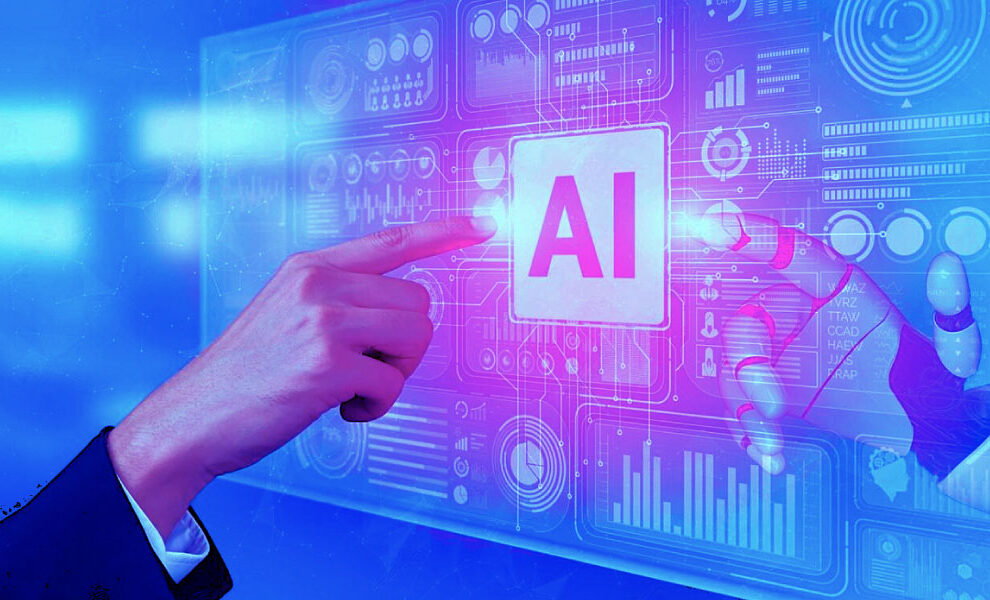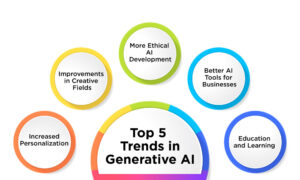Generative AI is evolving rapidly these days. Whether it is art and music, or it may be writing and coding, generative AI is changing the way we create and interact with technology. Let us explore the major trends in generative AI and its future.
What is Generative AI?
Generative AI refers to an algorithm that facilitates the creation of new things based on input data available already. That is generating images, writing text, composing music, and designing a product pretty much everything that can be conceptualized. The core concept here is that it learns from a vast amount of data to generate original content in some ways similar to the human creative process.
According to a report published in May 2024, 65% of users indicated that their organizations are utilizing generative AI, which is nearly double the percentage reported in the previous year’s survey.
Top 5 Trends in Generative AI:
Trend 1: Increased Personalization
One of the most exciting trends for 2024 is personalization through generative AI. Companies are using these tools to deliver experiences that are designed for each user. For example, streaming services like Netflix and Spotify use generative AI to recommend shows or songs you might like based on what you have watched or listened to many times. It makes entertainment more enjoyable and relevant to each person due to the level of personalization.
In e-commerce, companies are also using generative AI to personalize shopping experiences. Imagine a website that suggests outfits based on your style preferences or creates custom meal plans designed to your dietary needs. As generative AI advances, we can expect even more innovative ways to make our experiences unique.
Trend 2: Improvements in Creative Fields
Generative AI has enhanced creative industries. Artists, musicians, and writers are using these tools to enhance their work. For instance, visual artists are collaborating with AI to create incredible artwork that combines human creativity with machine-generated elements. This has increased the and also has generated new possibilities for artistic expression.
In February 2024, a report revealed that over four-fifths (83%) of creative professionals are using generative AI tools in their work, while 74% are incorporating them into their personal lives as well. Notably, 20% of global creative professionals reported that their companies or clients mandate the use of some form of generative AI in their work.
In music, generative AI helps composers create tracks that may be either emotive or fitting to any theme. Nowadays, artists are embracing AI as a collaborative partner rather than a replacement. The incorporation of human talent and AI capabilities is expected to lead to innovative art forms.
Trend 3: More Ethical AI Development
The increasing prevalence of generative AI has raised many ethical concerns and responsibilities. There is a strong focus on developing ethical guidelines for AI use. This includes that AI systems should always be transparent and not biased and respect the user’s privacy.
Many organizations are applying strict policies to avoid the misuse of AI-generated content. For instance, deepfake technology, which can create realistic but fake videos, might get used to spread misinformation. The goal is to create a safe environment where generative AI can be used without causing harm.
Trend 4: Better AI Tools for Businesses
In 2024, businesses are adopting generative AI tools to improve efficiency and productivity. It includes marketing and customer care services that enable businesses to automate tasks toward increased operational efficiency for many. For example, AI can generate marketing copy, design graphics, or even handle customer inquiries through chatbots.
This shift allows employees to concentrate more on strategic issues while AI deals with routine processes. This integration of generative AI into daily operations may save much time and cost and make businesses highly competitive in their respective fields.
Trend 5: Education and Learning
Generative AI is also making a big impact on education. In 2024, it is seen that many educational platforms are using AI to create personalized learning experiences designed for students. These systems can generate quizzes, provide instant feedback, and suggest resources based on a student’s progress.
Teachers are using AI to help create lesson plans and materials suitable for their respective classes. This makes teaching more effective, and students learn at their own pace. With the help of generative AI, the future of education is bright.
Final Words!
Generative AI is reshaping many different aspects of our lives as we are moving ahead in 2024. From customized experiences to creative collaborations to debates regarding ethics and improvement in businesses, the impact of AI is impressive. Despite all the existing challenges, what highlights the gen AI is the advancements and innovation in it that enhances creativity, efficiency, and personalization that humans have imagined.
With the development of technology, it is necessary to stay informed or updated on market trends and understand how they can benefit us in our daily lives. Generative AI is not just a tool, instead it is a partner in creativity and innovation, making our world a more exciting place.
To know more about Gen AI, visit us at HiTechNectar!
Also Read:
Is Generative AI the Future of Technology



